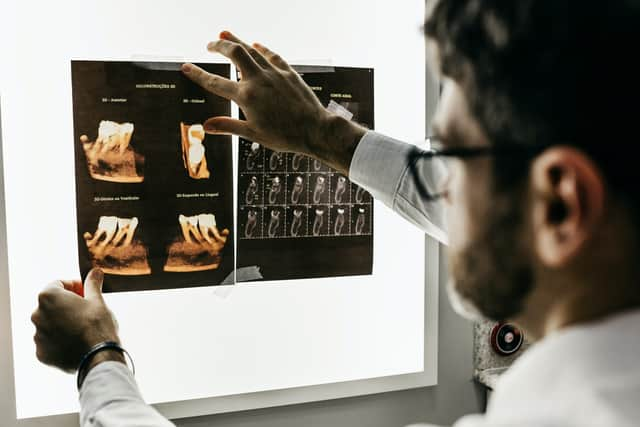Sheffield radiographers on strike over working conditions and low pay
and live on Freeview channel 276
Radiographers across Yorkshire are striking for 48 hours from 8am today, 25 July, to demand improvements to pay and working conditions.
Members of the Society of Radiographers, the trade union for those practising medical imaging and radiotherapy, are taking action at Trusts including Sheffield Teaching Hospitals, Doncaster and South Humber, Rotherham, and Airedale.
Advertisement
Hide AdAdvertisement
Hide AdMelissa, a radiographer working in a Sheffield hospital, said: “We’re doing well in excess of double hours sometimes. And that’s as a part-timer. Full-timers are doing about 70 hours a week.
“Working those hours, your brain sometimes can’t process things – it forgets how to relax. I feel like I’m constantly on edge, because I’m always thinking about work. You never get that separation of work and home life.”
Radiographers are the medical professionals responsible for carrying out X-rays, MRI and CT scans, ultrasounds, breast screenings, as well as radiotherapy for cancer patients.
Dean Rogers, executive director of industrial strategy and member relations for the Society of Radiographers, said: “Voting for strike action was a difficult decision for our members, who care above all about the safety and wellbeing of their patients.
Advertisement
Hide AdAdvertisement
Hide Ad“If the government wants to reduce NHS waiting lists and ensure that patients receive the treatment they need, when they need it, then it must urgently prioritise the recruitment and retention of radiography professionals – and that means talking to us about pay and conditions. But they are refusing to talk to us, even though our door is open.
“Our members deserve better. Our patients deserve better.”
One million people are currently on NHS waiting lists for radiography services, meaning vital diagnosis and treatment can be delayed for months.


Melissa adds: “Everyone in my team is so dedicated to putting patients first. We’re often cancelling plans at weekends and shifting plans around. It’s great that everyone is so dedicated. But in the last year, work has really started to take over people’s lives.
Advertisement
Hide AdAdvertisement
Hide Ad“My children are seven and 13. My little girl sometimes cries when I go to work, because I go to work a lot. My older one, she understands why I’m not there. But it does affect her. She misses having her mum there.”
Low pay, coupled with long hours, is forcing radiographers to leave the profession.
Melissa said: “I’ve considered moving out of the public sector. I don’t want to do that, but I wonder how long I can carry on as I am.”
The Society of Radiographers says that the government could reduce waiting lists, save lives and save taxpayers’ money by implementing a modern workforce recruitment and retention plan, including a fair starting salary for radiography professionals from 2023-24 onwards.
Advertisement
Hide AdAdvertisement
Hide AdDean adds: “We need to draw attention to the fact that many radiography professionals are feeling burnt out by low pay and increased hours. They’re leaving the NHS, and they are not being replaced in adequate numbers.”
Comment Guidelines
National World encourages reader discussion on our stories. User feedback, insights and back-and-forth exchanges add a rich layer of context to reporting. Please review our Community Guidelines before commenting.